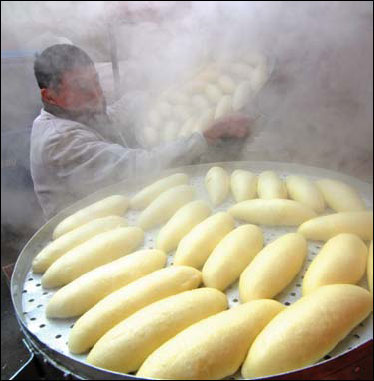Steamed buns are a big deal
Updated: 2012-01-13 07:50
By Hu Yijun (胡逸君) (China Daily)
|
|||||||||||
|
|
Making mantou is fun, and the results are delicious
Tofu, meat and chicken are obviously not enough for Chinese New Year. Two days before the Spring Festival, Chinese people finish their last and most important food - mantou (馒头 mántou). The 28th and 29th days of the last month in the lunar calendar are the days for making mantou, or steamed buns.
The legend of mantou dates back to the age of the Three Kingdoms (AD 220-280). A fortune teller told Kong Ming to sacrifice 49 human heads in order to bless his soldiers. But Kong Ming found it too cruel, and could not bring himself to do it. Then he came up with an idea: use flour to make head-like buns as a substitute for the sacrifice.
The first step to make steamed buns is leaven dough. In Chinese it is called 发面 (fāmiàn); the character 发 is the same one in 发财 (fācái, make a fortune), which makes making mantou an auspicious endeavor. Also, the making of steamed buns (蒸馒头 zhēng mántou) reminds people of the process of becoming more and more prosperous (蒸蒸日上 zhēngzhēngrìshàng).
Winter can get really cold. As a result, in the past, the dough of the steamed buns might require a whole day to be leavened properly, since the quality of the leavened dough determines the taste of steamed buns.
After this is done, skillful housewives would turn the big loaf of dough into delicate buns of different shapes or even colors, such as the "smashed bean bun", the "rabbit or hedgehog steamed bun" and steamed buns with bright red toppings.
Making steamed buns is a big deal in families, and only adults have the right to take part in it. If the steamed buns get ruptured in the process of making them, no one in the family is allowed to say: "馒头裂了。" ("The bun has cracked.") Instead, people say: "馒头开花了 。" ("The bun has blossomed.") because it sounds nicer - that is important during the Spring Festival.
Today's Top News
Rescuers race against time for quake victims
Telecom workers restore links
Coal mine blast kills 18 in Jilin
Intl scholarship puts China on the map
More bird flu patients discharged
Gold loses sheen, but still a safe bet
US 'turns blind eye to human rights'
Telecom workers restore links
Hot Topics
Lunar probe , China growth forecasts, Emission rules get tougher, China seen through 'colored lens', International board,
Editor's Picks

|

|

|

|

|

|






